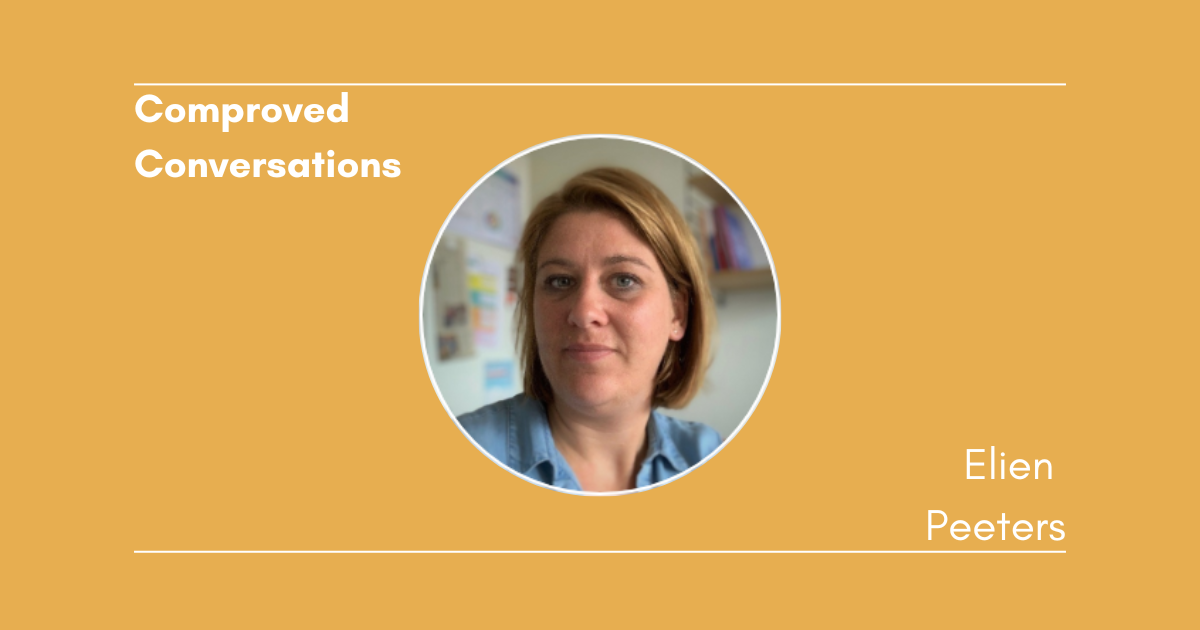
09 Mar More efficient meetings thanks to comparing tool
A few months ago, we were invited to attend a workshop on Comproved held at a College Congress at the Thomas More University in Geel, Belgium. Afterwards, we managed to get hold of one of the speakers, Elien Peeters, for an interview. Elien coordinates the Practical Office for Primary Education, which reflects on the internships in the Bachelors Teacher Training in Pre-primary and Primary Education. In the search for how the different courses can learn from each other without losing their individuality, they have been successfully using Comproved for several years. Thanks to the tool, teachers now not only reach a widely supported judgement faster during the committee meeting, but the meetings are also more efficient.
How did you find out about Comproved?
“That was thanks to the colleagues from the Primary Education course. They were looking for an alternative way to evaluate the internships during the corona period. After all, these could not take place as usual because schools were closed. The students were assessed differently during this period, namely through assignments such as lesson preparations or self-made videos in which they taught an imaginary class. However, the judgement of a supervisor was absent in this process. The university teacher was thus entirely responsible for the internship assessment. As this compromised the reliability of the evaluation, they started using Comproved. The assessment tool allowed multiple assessors to judge the student’s performance in relation to the internship and together make a more reliable judgement.”
That inspired you to use the tool for other purposes as well?
“Indeed. During and after the corona period, we were also looking for a way to make committee meetings more efficient. Previously, at the end of an internship period, we met with all the teachers involved for a whole day to discuss all the students. Due to corona, that meeting had to take place online. You can imagine that meeting online for a whole day is not ideal.”
“So, we were looking for a way to make that meeting shorter but also more powerful. We heard that the Primary Education colleagues were satisfied with Comproved, so we decided to use the tool to prepare the committee as well. By having the results of the internships for each student assessed by all teachers beforehand, we now had something tangible – namely the ranking coming out of Comproved – at the start of the meeting. We could then compare that ranking with the anchor teacher’s assessment. That helped to discuss students’ internships in a more focused way. That saved us a lot of time.”
Can you tell us a bit more about that gain in time?
“Some teachers, after such an intense internship period, feel the need to vent and tell a lot about their student. This used to happen often during the committee, but we don’t actually have time for it at that moment. Because we now have a starting point with Comproved’s rank order, we can have much more focused and fundamental discussions. We no longer need to discuss the students for whom Comproved shows that the teachers agree with each other. Only when the anchor teacher had a completely different grade in mind than what comes out of Comproved, the student is discussed. The failing grades are, of course, still discussed as well. That’s how it comes that a committee takes up much less time now.”
“For discussing anchor teachers’ concerns regarding internships, we schedule moments during the year to act on them in a more targeted way even before the internship ends.”
The ranking that comes out of Comproved is a good starting point to get straight to the heart of the matter during the committee.
And now, post corona, are you still working that way?
“Comproved proved to be a powerful way to prepare the committee meeting. Before, we used to compare students during the meeting. We were completely dependent on the discourse of the anchor teacher. Sometimes, we lost a lot of time on details and less relevant issues. Now, with Comproved, we make the comparisons beforehand in a more fundamental and scientific way. Moreover, the ranking that comes out of Comproved is a good starting point to get straight to the heart of the matter during the committee.”
“We have also regularly checked with colleagues whether they find using Comproved useful. A prerequisite for working with the tool is that all teachers involved see fit to write a good ‘onepager’ about their student(s). It is not so easy to capture a student’s competency in an A4. So, it does take some effort to write such a onepager tailored to the criteria we set and with enough information to make the comparisons. Fortunately, the teachers still find it a useful method.”
What exactly is such a onepager?
“In the Preschool Education programme, at the end of the internship period, we organise a three-way discussion with the anchor teacher, the mentor and the student. There, we discuss the internship as a whole, taking into account the feedback reports from the teacher, the mentor and the student. That discussion results in a synthesis report. It is from that report that a summary with strengths and working points is made, supplemented by a visual representation of the performance per criterion. That summary is the so-called “onepager” that is ultimately used for assessment in Comproved.”
“When all onepagers are uploaded in Comproved, the anchor teachers make the comparisons. For each pair, they then have to indicate the onepager they think best meets the criteria of that particular internship. In the end, we obtain a ranking from the least to the best performing student. This ranking thus reflects the consensus among all lecturers and is therefore a good starting point for discussion during the committee.”
How do the teachers experience this assessment method?
“Such a committee used to be very long. You can imagine that after a while, fatigue started to set in and it was no longer possible to listen 100% attentively. Therefore, as the committee progressed, students were often discussed more quickly. With Comproved, each student is now thoroughly assessed. Moreover, the final judgement is now truly supported by the entire team. Towards the students, this is only fairer and it gives the teachers peace of mind.”
By using Comproved, every teacher now assesses every student. The judgement is thus supported by the entire team. Therefore, the final grades really do justice to the students' performances.
What do you think is the biggest advantage of working with Comproved?
“We did get comments from students, but also from the field, that they see a lot of differences in the way teachers assess. Each student is monitored by one anchor teacher during his or her internship. And although we have set clear criteria, the assessment still depends on that one tutor and what words he or she gives to it during the committee. By using Comproved, every lecturer now assesses every student. So the judgement is supported by the entire team. Therefore, the final grades really do justice to the students’ performances.”
“Another advantage is practical-organisational. Organising such a committee is not easy with teachers’ packed timetables. Previously, we had to get about 20 colleagues together for a full day. Now teachers can schedule the preparatory work, the comparisons in Comproved, when it suits them. The committee itself takes up much less time.”
Do you experience challenges with Comproved?
“Although the committee now takes up less time, with Comproved we’ve added some steps in the assessment process. For instance, the onepagers have to be ready on time and of good quality. Monitoring deadlines is an extra challenge. After all, the comparisons in Comproved must be ready on time so that we, as coordinators, still have enough time to prepare the committee. In a busy evaluation period, it’s always a bit challenging to get the puzzle laid. But so far we’ve always succeeded.”
Do you notice interest in this assessment method from other courses?
“Yes, absolutely. That’s why we also try to inspire other teachers by, for instance, giving a workshop on Comproved from time to time. We hope to create even more dialogue with courses with similar internships in the future. A lot of courses are probably looking for a way to assess internships in a more reliable and valid way.”
Do you also want more efficient meetings and assessments? Find out all about the comparing tool in our e-book or contact us with your specific questions.




